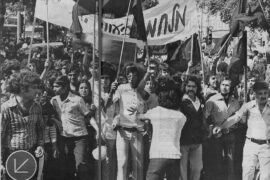Parshat Vayigash concludes with an ominous statement that has echoed throughout our history.
“Thus Israel settled in the land of Egypt in the region of Goshen; they acquired property in it and they were fruitful and multiplied greatly.” (B’reishit 47:27)
On this verse, the Kli Yakar comments that the children of Israel no longer regarded themselves as aliens sojourning in Egypt but rather as permanent residents. He further explains that “so completely settled did they become that they did not wish to leave Egypt and HaShem had to remove them by force. Those who did not wish to leave died during the three days of darkness.”
Israel settled in Egypt, established deep roots and enjoyed material success, setting a pattern that would come to define Jewish behavior in later Diasporas. Nearly every foreign land that we have settled in throughout history was initially a safe refuge or land of opportunity, yet Jews have often attempted to turn these places of temporary shelter into permanent homes. And in almost every instance, the natural order of history has reacted by shattering our false sense of security on foreign soil and reminding us that we are not yet home in our own country.
“Had the dove found a resting place, it would not have returned. A similar verse is, ‘She dwells among the nations; she finds no rest’ (Eikha 1:3). If they found rest, they would not return. Similar also is D’varim 28:65, ‘Among the nations you will feel insecure; there will be no place for your foot to rest.’ If they found rest, they would not return.” (B’reishit Rabbah 33:6)
The Gaon of Vilna was distressed by the thought of Jews suffering due to our remaining in the exile of our own free will at a time when the possibility exists to return home. In the first chapter of Kol HaTor, the Gaon’s teachings on Mashiaḥ ben Yosef and the redemption process (compiled by his student Rabbi Hillel Rivlin of Shklov), there is mention of refugees.
“Refugees in Zion. The fifth principle is that ‘for on Mount Zion and in Jerusalem there will be those who escape… and among the remnant, those whom the L-rd will call.’ (Yoel 3:5) Since according to Midrash Tanḥuma, Zion is in the line of Mashiaḥ ben Yosef, whatever befell Yosef befell Zion. The Gaon said that this is hinted at also in the word ‘among the remnant’ which in numerical value equals ‘Mashiaḥ ben Yosef’ (566), by means of whom, according to the Gaon, the ingathering of the exiles will be accomplished. As the number of ingathered increases, so the Sitra Aḥra (evil forces) will increase its strength. Then another prosecutor will be added, against those who do not strengthen the ingathering of exiles after the beginning of the redemption has started with the ingathering, for then in ‘Zion and in Jerusalem there will be those who escape… and among the remnant…’ A word to the wise is sufficient. This distressed the Gaon a great deal.”
The question is often raised why so many otherwise faithful Jews have chosen to voluntarily live on foreign soil if the Torah so clearly dictates the need for the Jewish people to reside in Eretz Yisrael. And why might we sometimes even find learned rabbis who go so far as to reject the mitzvah to live in our homeland? In the fifth chapter of Kol HaTor, the Gaon is quoted as explaining the deeper reason why many great scholars do not encourage their followers to actively participate in the redemption process.
“The Sin of the Spies… hovers over the Nation of Israel in every generation… How strong is the power of the Sitra Aḥra that it succeeds in hiding from the eyes of our holy fathers the dangers of the klipot; from the eyes of Avraham our father, the klipah of exile… and in the time of the Mashiaḥ, the Sitra Aḥra attacks the guardians of Torah with blinders… Many of the sinners in this great sin of, ‘They despised the cherished land,’ and also many of the guardians of Torah, will not know or understand that they are caught in the Sin of the Spies, that they have been sucked into the Sin of the Spies in many false ideas and empty claims, and they cover their ideas with the already proven fallacy that the mitzvah of the settlement of Israel no longer applies in our day, an opinion which has already been disproven by the giants of the world, the Rishonim and Aḥronim.” (Kol HaTor chapter 5)
Anything that delays the sanctification of G-D’s Name consequentially profanes it. By rejecting the mitzvah of building the Hebrew nation in Eretz Yisrael and magnifying HaShem’s Divine Ideal to humankind, many otherwise righteous individuals have become guilty of decreasing the universal perception of His all-encompassing Oneness.
“See – HaShem, your G-D, has placed the land before you; go up and possess, as HaShem, G-D of your forefathers, has spoken to you. Do not fear and do not lose resolve.” (D’varim 1:21)
The Ramban explains (Positive Commandment 4 in his supplement to the Rambam’s Sefer HaMitzvot) that this mitzvah of conquering and residing in Eretz Yisrael is a commandment for every generation at all times. The Shulḥan Arukh states on this issue (Even HaEzer 75, Pitḥei Tshuva 6) that all of the arbitrators of Torah law (Rishonim and Aḥronim) follow the opinion of the Ramban.
Because history demands that Israel’s exile be annulled, we can no longer expect to dwell securely in the Diaspora. By neglecting to willingly return home to our soil, Jews are not only scorning our people’s national aspirations but also the very purpose of our entire Torah. And because the state of Jews living outside our borders is both an unnatural situation and an objective desecration of HaShem’s Ideal for this world, it must ultimately come to an end one way or another.
What sustains the Jewish Diaspora today is an illusion of ourselves as isolated individuals disconnected from the greater Israeli collective. The Hebrew nation, however, is actually not the sum total of every Jew but rather one colossal spirit that expresses itself in space and time through millions of seemingly disconnected bodies.
While human beings each possess a personal soul, the nation of Israel shares one massive national soul – like a giant tree of which each Jew is a unique branch. The illusion of our separateness traps us in a psychological prison largely focused on personal security and individual success. The Maharal of Prague explains in Netzaḥ Yisrael that this mental slavery is hinted at within the Hebrew language itself. The only difference between the words gola (exile) and geula (redemption) is the letter aleph, which possesses the numerical value of “One” – symbolizing a holistic perspective that recognizes our inner unity.
Whoever chooses to remain in the exile, thereby fighting the historic tide of Israel’s redemption, is essentially negating the concept of One – the belief and complete certainty in the unity of Israel and HaShem – in G-D being One and His Name being One over and beyond all that exists.
Only by arriving at the awareness of One – the intrinsic unity and collective destiny of Am Yisrael – will Jews be able to break free from our egoistic mental prisons and accept our roles as parts of the greater Israeli whole. We will be able to perceive HaShem’s unity in history and Creation and will be able to fully devote ourselves to participating in the incredible historic events of our day. And once the Hebrew nation is psychologically free, we can focus on living up to our national mission as a “kingdom of priests and a holy nation” (Sh’mot 19:6) that will shine Divine blessing to all humankind.





